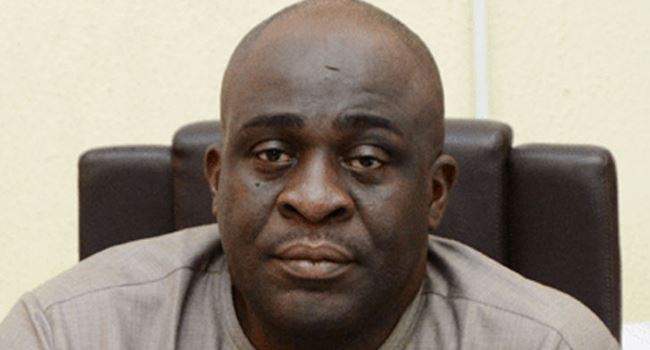Politics
Nigeria to launch another satellite in June

The National Space Research and Development Agency (NASRDA) has stated that it is putting modalities in place to launch a Cubesat ‘Edusat-2’ within the first half of the year.
The Acting Director-General of NASRDA, Dr Francis Chizea, said this at the ongoing Science and Technology Expo on Tuesday, March 16, in Abuja, where the agency showcased its research works and achievements.
The science expo is with the theme “Science, Technology and Innovation for Economic Recovery and Sustainability Amidst the COVID-19 Challenges” and is a platform to showcase innovation within agencies of government, private research institutions, the academia, among other participants.
Chizea explained that EduSat-2 was a build-up on EduSat-1 which the agency built in collaboration with the Federal University of Technology, Akure and the Japanese Birds-1 programme launched in 2017.
A CubeSat is a type of very small satellite which is based on a standardised unit of mass and volume. It can be used alone or stacked to suit the needs of a specific mission.
He said that the agency was working in line with the National Space Policy and Programme (NSPP) of 2001 and the Federal Government approved 25 years Roadmap for the agency in 2007.
He said that the CubeSat was in line with the agency’s mandate which included building indigenous satellites, launching a Nigerian astronaut into space, build and launch a Nigerian made satellite in space.
Chizea said “EduSat- 2 was developed by NASRDA engineers, an earth observation satellite with minimal resolution and we are expecting to launch it in June or July from the International Space Station.
“We are already talking with the committee on the Peaceful Use of the Outer Space to help us secure launch facilities on one of the member countries, which have the facilities to provide for us.
Read also: Buhari asks Senate to confirm Shaba as NASRDA DG
“The satellite is one of its kinds to be made by Nigeria and the only thing we can do now is to develop on that.
“The major thing the satellite will address is a technology demonstration, to show that we can do it by ourselves, we want to show that it can work,” he said.
Chizea called on the private sector to come in and support the space programme of the country, meet NASRDA’s mission, generate significant economic returns and create jobs.
”Potential areas of Public-Private Partnership includes space communication and telecommunications, satellite servicing and space systems, interplanetary small satellites, remote sensing, strategic space applications, software development, among others.”
He, however, said that the level of technology development of a country reflected its political and economic strength, while the level of space technology reflected the comprehensive power of a nation.
According to Chizea, Nigeria is a political epicentre that is crucial for the economic development of Africa cannot afford to miss out on developing its space industry.
Join the conversation
Support Ripples Nigeria, hold up solutions journalism
Balanced, fearless journalism driven by data comes at huge financial costs.
As a media platform, we hold leadership accountable and will not trade the right to press freedom and free speech for a piece of cake.
If you like what we do, and are ready to uphold solutions journalism, kindly donate to the Ripples Nigeria cause.
Your support would help to ensure that citizens and institutions continue to have free access to credible and reliable information for societal development.






















